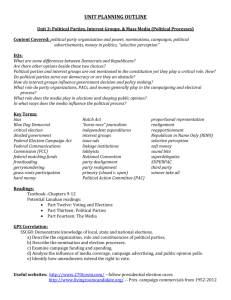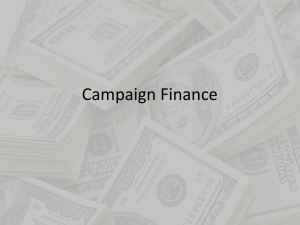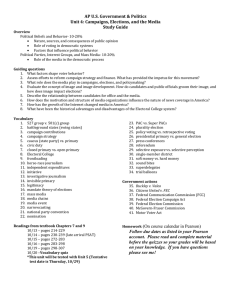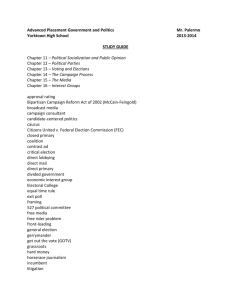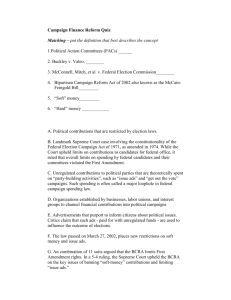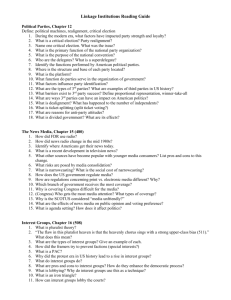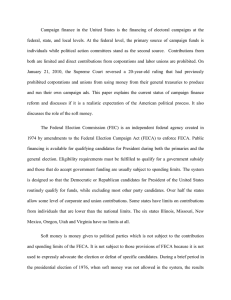Regulated Campaign Spending, and can Companies and Charities unknowingly be in
advertisement
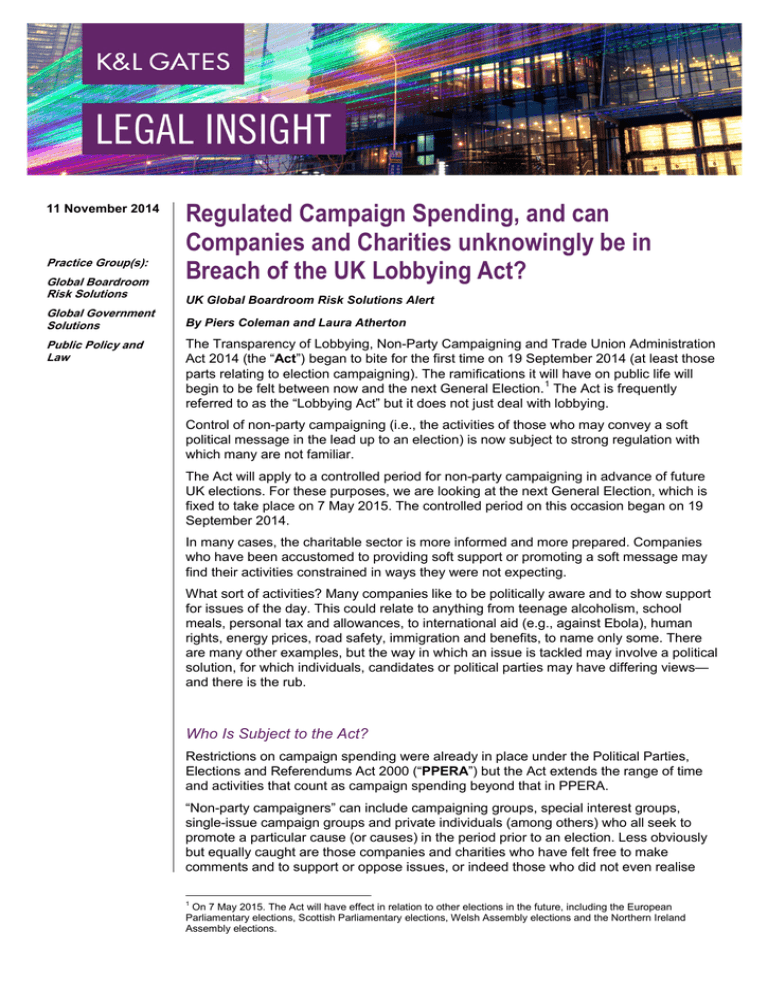
11 November 2014 Practice Group(s): Global Boardroom Risk Solutions Global Government Solutions Public Policy and Law Regulated Campaign Spending, and can Companies and Charities unknowingly be in Breach of the UK Lobbying Act? UK Global Boardroom Risk Solutions Alert By Piers Coleman and Laura Atherton The Transparency of Lobbying, Non-Party Campaigning and Trade Union Administration Act 2014 (the “Act”) began to bite for the first time on 19 September 2014 (at least those parts relating to election campaigning). The ramifications it will have on public life will begin to be felt between now and the next General Election. 1 The Act is frequently referred to as the “Lobbying Act” but it does not just deal with lobbying. Control of non-party campaigning (i.e., the activities of those who may convey a soft political message in the lead up to an election) is now subject to strong regulation with which many are not familiar. The Act will apply to a controlled period for non-party campaigning in advance of future UK elections. For these purposes, we are looking at the next General Election, which is fixed to take place on 7 May 2015. The controlled period on this occasion began on 19 September 2014. In many cases, the charitable sector is more informed and more prepared. Companies who have been accustomed to providing soft support or promoting a soft message may find their activities constrained in ways they were not expecting. What sort of activities? Many companies like to be politically aware and to show support for issues of the day. This could relate to anything from teenage alcoholism, school meals, personal tax and allowances, to international aid (e.g., against Ebola), human rights, energy prices, road safety, immigration and benefits, to name only some. There are many other examples, but the way in which an issue is tackled may involve a political solution, for which individuals, candidates or political parties may have differing views— and there is the rub. Who Is Subject to the Act? Restrictions on campaign spending were already in place under the Political Parties, Elections and Referendums Act 2000 (“PPERA”) but the Act extends the range of time and activities that count as campaign spending beyond that in PPERA. “Non-party campaigners” can include campaigning groups, special interest groups, single-issue campaign groups and private individuals (among others) who all seek to promote a particular cause (or causes) in the period prior to an election. Less obviously but equally caught are those companies and charities who have felt free to make comments and to support or oppose issues, or indeed those who did not even realise 1 On 7 May 2015. The Act will have effect in relation to other elections in the future, including the European Parliamentary elections, Scottish Parliamentary elections, Welsh Assembly elections and the Northern Ireland Assembly elections. Regulated Campaign Spending, and can Companies and Charities Unknowingly be in Breach of the UK Lobbying Act? that the financial support that they were providing could be treated as campaign spending. Importantly, the limits imposed by the Act restrict campaign spending regardless of a company or group’s jurisdiction. Only companies and organisations based in the UK, or European Union companies or organisations with business interests in the UK, are able to register for higher spending thresholds. With the growth of social media, easy communication and accessible content comes greater sharing of opinions and opportunities to influence. The purpose behind the legislation is to try to maintain a level playing field: in elections, political parties are already subject to strict campaign spending limits, and the idea is that other campaigners (single issue or multiple issues) should be subject to the same controls. In doing so, and because influence can sometimes be unintentional or part of a greater agenda, the controls have arguably become quite draconian. What does the Act do? Among other items, the Act regulates and restricts 2 election campaign spending by those not standing for election or registered as political parties (i.e. “non-parties”). It creates a register for non-party campaigners who exceed certain low thresholds for spending on campaign material and obliges those who are registered to comply with various reporting and other obligations. What does registration involve? Why register? If you register, your maximum spending limits during election periods will be higher. Moreover, and provided that you do not spend too much (there are limits even when registered), by registering you can avoid inadvertently incurring civil or criminal penalties. Registration is a simple process and can be done online or by submitting a Form (“Form TP1”) by post or email to the Electoral Commission. Although only basic information needs to be supplied in order to register, the consequential reporting obligations are more onerous. You may have to submit accounts and/or report your activities to the Electoral Commission regularly in the lead up to the election. What counts as election campaigning? The Electoral Commission has provided some guidance on what constitutes election campaign material. A sensible starting point is to assume that any medium through which you communicate with the public may be classed as election campaign material if it can reasonably be regarded as intended to influence people’s voting choice.3 An item can be election campaign material even if you actually intend it to achieve something else - to raise awareness of an issue, provide support for a cause or seek a 2 If you intend to spend more than £20,000 in England, or £10,000 in Scotland, Wales or Northern Ireland on regulated campaign activity during the “regulated” period, including campaigning at the UK Parliamentary general election, you must register as a recognised non-party campaigner and follow the rules on campaign spending, donations and reporting. If you do not register, or are not eligible to register, you cannot spend more than £20,000 in England or £10,000 in any of Scotland, Wales or Northern Ireland on regulated campaign activity during a regulated period. 3 Examples given by the Electoral Commission include leaflets, websites, press conferences and advertising. 2 Regulated Campaign Spending, and can Companies and Charities Unknowingly be in Breach of the UK Lobbying Act? purely commercial (as opposed to a political) benefit. This is because the test of intention is what the reasonable bystander would think rather than what you think. To be campaign material, the item must meet two tests: the purpose test (i.e., does it, looked at objectively, promote or oppose a party, candidate or category of candidates, or a policy or issue closely associated with a party) and the publicity test (i.e., are you communicating with the public). There is no need for material to name a particular party or candidate to count as election campaign material. How might you (consciously or not consciously) be election campaigning? Depending upon their exact nature and the circumstances at the time, the following are a few illustrations of activities that might be treated as election campaigning by a non-party: • A campaign that seeks views about individual candidates’ support for a particular issue. • An advertising campaign that mocks or satirises a political party or candidate. • An open letter published (as an advertisement) in a national newspaper that advocates staying in or leaving the European Union. 4 • A conference or a seminar designed to seek or promote views about economic issues such as levels of personal taxation or the level of the minimum wage. • A rally designed to address rural issues such as the ban on hunting or the culling of badgers, including the production of give-away material or leaflets for that rally. • An initiative promoted through your website (or through a video feed on or linked to your website) that advocates a particular stand on an environmental issue. • Use of images and/or video of senior corporate representatives with members of political parties in advertising and PR, which could imply that you are aligned with those parties, or the use of symbols or images closely associated with a party or candidate. • A public announcement on a corporate initiative, which may be viewed as advocating a social policy (e.g., parental leave, discrimination, donations to overseas development and foreign aid programmes). • Allowing facilities or premises to be used by an organisation such as a charity or nongovernmental organisation with an overtly political agenda (e.g., animal testing, nuclear power campaigns). • Sponsoring an event or conference that has a political agenda. These are only illustrations. Each will depend on its own facts and the particular political alignment that may be supported or opposed. What is not caught? The Electoral Commission’s guidance suggests that if a political party adopts a policy that reflects a viewpoint that you are already communicating to the public, this will not make your communications into election campaign material. However, if you publicise the 4 The definition of election spending could include not just the cost of placing the letter/advertisement in the newspaper but paying someone to write it and the associated PR and press conference activities that go with it. 3 Regulated Campaign Spending, and can Companies and Charities Unknowingly be in Breach of the UK Lobbying Act? political party’s support for your viewpoint in subsequent communications to the public, or alter or increase activity on the policy as a result of this support, you could then bring your activity within the definition of election campaigning. Offences and Penalties, Criminal and Civil Sanctions? There are a number of criminal offences under PPERA as amended by the Act. Most importantly, under section 94, a person will commit an offence if they exceed permitted expenditure on regulated campaign activity and they knew or ought to have known that such expenditure on regulated activity would exceed the permitted limits. If the person is an organisation, then individuals within the organisation may also be guilty of the same offence if they personally knew or should have known. One of the most important offences is the exceeding of the permitted expenditure limit on election campaigning. Senior officers of a company who had responsibility (or should have had responsibility) for the campaigning and for accounting for the cost may also be guilty of the same offence. Individuals convicted may face a fine and/or a custodial sentence. If you register with the Electoral Commission, the permitted limit of expenditure is £319,000 for England, £35,400 for Scotland, £24,000 for Wales and £10,800 for Northern Ireland. You can still commit an offence if you exceed the permitted limit, even if registered. The difference is that registration allows you to incur substantially greater expenditure on election campaigns without being subject to investigation. There are also several penalties for other breaches, such as making a false declaration to the Electoral Commission and failing to comply with reporting obligations. There are also civil penalties for other breaches. Companies that do not comply with the new regulations could be required to pay a fine and to take steps to ensure that the offence of contravention does not recur and/or no longer carry on the activity. If you have been consciously election campaigning, or unconsciously campaigning and not appreciating that you were in breach of the rules, what should you do? • Was the campaigning that you have been doing election campaigning under the Act? • How much have you spent? How much do you plan on spending? • Consider whether to cease the campaigning with immediate effect and not have to register, or whether or not to register. Consider whether the compliance risks and general public exposure of registration is warranted. Consider speaking to the Electoral Commission to obtain their views. • Make an assessment of whether you could be considered to be involved in regulated campaign activity. • If so, look at your likely spending. Will it breach or be close to the permitted limits? 4 Regulated Campaign Spending, and can Companies and Charities Unknowingly be in Breach of the UK Lobbying Act? • Consider your risk; is it worth registering with the additional reporting and other compliance burdens that it will bring or would it be better to modify your behaviour or educate your relevant workforce to avoid infringement? • If a political party adopts a policy or position you already hold, consider carefully ensuring that you make no changes in response. • Ensure that those responsible for creating and implementing corporate communications with the public of all kinds receive some level of awareness training to ensure that any potential issues can be identified and addressed. • Take advice generally—this is a new, untested and difficult area. Authors: Piers Coleman piers.coleman@klgates.com +44.(0)20.7360.8206 Laura Atherton laura.atherton@klgates.com +44.(0)20.7360.8322 Anchorage Austin Beijing Berlin Boston Brisbane Brussels Charleston Charlotte Chicago Dallas Doha Dubai Fort Worth Frankfurt Harrisburg Hong Kong Houston London Los Angeles Melbourne Miami Milan Moscow Newark New York Orange County Palo Alto Paris Perth Pittsburgh Portland Raleigh Research Triangle Park San Francisco São Paulo Seattle Seoul Shanghai Singapore Spokane Sydney Taipei Tokyo Warsaw Washington, D.C. Wilmington K&L Gates comprises more than 2,000 lawyers globally who practice in fully integrated offices located on five continents. The firm represents leading multinational corporations, growth and middle-market companies, capital markets participants and entrepreneurs in every major industry group as well as public sector entities, educational institutions, philanthropic organizations and individuals. For more information about K&L Gates or its locations, practices and registrations, visit www.klgates.com. This publication is for informational purposes and does not contain or convey legal advice. The information herein should not be used or relied upon in regard to any particular facts or circumstances without first consulting a lawyer. © 2014 K&L Gates LLP. All Rights Reserved. 5

